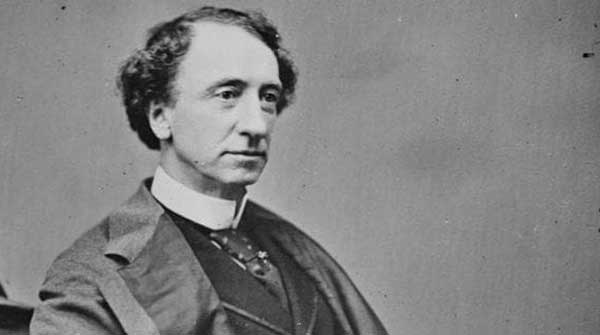John A. Macdonald had close friendships with Indian leaders and a deep respect for their ancient culture
 At the time of Confederation, Canada’s Plains Indians were in a desperate situation.
At the time of Confederation, Canada’s Plains Indians were in a desperate situation.
The same European-introduced guns and horses that resulted in a briefly glorious golden age for them had also resulted in constant inter-tribal warfare and the rapid disappearance of the buffalo. Many tribes were starving by the 1880s. Another European introduction – smallpox – was simultaneously devastating entire communities. Corpses rotted in tents. Entire communities died a horrible death.
At the same time this horror was playing out, American whiskey traders were killing the Indians the disease spared with their dreadful rotgut whiskey. The Indian population was in rapid decline.
Meanwhile, to the south, American Indians were being brutalized by an American cavalry ruthlessly clearing the American plains for settlers greedy for land. Those land-hungry American settlers were already looking north. It was clear unless Canada took control of the western plains, that would also be the fate of Canada’s already beleaguered Indians. Let’s remember that Canadian Indians referred to the border as the “Medicine Line:” To the south was “bad medicine”; to the north was healing.
 |
| Related Stories |
| John A. Macdonald’s mistake
|
| Criticizing Macdonald is fair game but leave statues alone
|
| Indian Act again under attack
|
It was into this Indian dystopia that John A. Macdonald entered the picture and began his long and remarkable career. Saving the Plains Indians was only one item on the very ambitious agenda he set for himself. But save them he did.
Here’s how:
- Smallpox: This disease, known as the “red death,” was a major killer until Edward Jenner’s vaccine gradually eliminated it as a threat. However, it was particularly deadly for Indians because they had no immunity to it. Programs were started early in Canada’s history to vaccinate Indian populations, but it was the government of Sir John A. Macdonald that initiated what was by far the most aggressive Indian vaccination policy. For understandable reasons, many Indians were very reluctant to have needles containing suspicious substances stuck into them. However, so determined was Macdonald to save the Indians from this awful disease he even resorted to threatening to withhold treaty money from Indians who refused the needle. The Indians reluctantly but finally accepted the jab, and smallpox permanently disappeared as a lethal threat to them. Macdonald can be accused of conducting an aggressive vaccination policy, but in this case, no one can reasonably argue that the ends didn’t justify the means.
- Whiskey: The rotgut whiskey sold to the Plains Indians by American whiskey traders was killing them. Chiefs despaired as their people killed one another in their drunkenness. Macdonald saw what was happening and responded. He created the Northwest Mounted Police, which chased the whiskey traders back across the border and kept them there. Although liquor would remain a major problem for the Indians, the lethal threat was addressed. The Indian chiefs thanked the police, and John A specifically.
- Starvation: The overhunting of buffalo that resulted from the European introduction of the horse and rifle eventually resulted in starvation among the Plains Indians. The federal government had to step in to feed them. Although Macdonald is criticized as being too stingy, it was mainly through his efforts the federal government provided the rations necessary to keep the Plains Indians from starving. The truth is MacDonald’s Liberal opponents tried to cut back on the ration; it was Macdonald who insisted that adequate rations be provided.
- Treaties: Macdonald also insisted that treaties, now revered by the Indian community, be negotiated. Doing so accomplished many things at once. First, it ended the inter-tribal warfare that was killing so many. The Indians agreed in the treaties they would stop warring with one another. Secondly, it guaranteed peace between the white man and the Indians. This allowed Macdonald to bring in the railway and then the settlers who would bind Canada together. This prevented the West and British Columbia from being consumed by the American colossus. Canada’s Indians escaped the bloody fate of the American Indians and their Trail of Tears. Macdonald was justly proud of this accomplishment.
- Education: Macdonald and the progressive Indian leaders of the time – some of whom were MacDonald’s close friends – were acutely aware education was essential if young Indians were to be successful. Thus, providing education to Indian children was a treaty obligation demanded by the Indian chiefs and gratefully granted by the federal government. The numbered treaties included provisions that schools would be built on reserves if requested. All of the chiefs made that request.
However, sitting in schools was foreign to Indian culture, and the schools were not providing the education that young indigenous people needed. So, in 1883, Macdonald began the residential school program. A relatively poor federal government would bear the significant expense of boarding and educating a select few indigenous children, who went on to become the leaders of their people.
But Macdonald insisted from the outset attendance be purely voluntary. Only Indian parents who chose to send their children to a residential school would have their children admitted. No Indian parent was forced to send their children to any school during the entire time Macdonald held public office. (In fact, compulsory school attendance for status Indians at schools of any kind only became law in 1920, long after Macdonald died.) Perhaps the most startling fact is Macdonald was building schools for Indian parents who wanted them for their children while the American cavalry was still shooting at American Indians. The last Sioux War ended only in 1890.
John A. Macdonald was proud of his accomplishments with Canada’s Indian people. He had close friendships with Indian leaders and a deep respect for their ancient culture. It was Macdonald who granted the vote to Indians (although it was later taken away by Laurier). Although he is now criticized for thinking and talking like the Victorian that he was, he was a friend to the Indian and justly proud of it.
Not everything he did in his long career directly benefited the Indians. Some of the decisions he had to make in his long career may even have adversely affected them. After all, the plight of the Plains Indians was just one problem on a very long list that this remarkable man took upon himself to solve. But overall, he was a friend to the Indian. If not for him, they might have disappeared or sunk into irrelevance.
They didn’t. In fact, the Plains Indians have thrived. Thanks in large part to Macdonald, the population of the Plains Indian has increased at least tenfold since his time.
Historian Richard Gwyn famously said, “No Macdonald, no Canada.” It might just as accurately be stated, “No Macdonald, no Plains Indians.”
Brian Giesbrecht, a retired judge, is a Senior Fellow at the Frontier Centre for Public Policy.
For interview requests, click here.
The opinions expressed by our columnists and contributors are theirs alone and do not inherently or expressly reflect the views of our publication.
© Troy Media
Troy Media is an editorial content provider to media outlets and its own hosted community news outlets across Canada.
